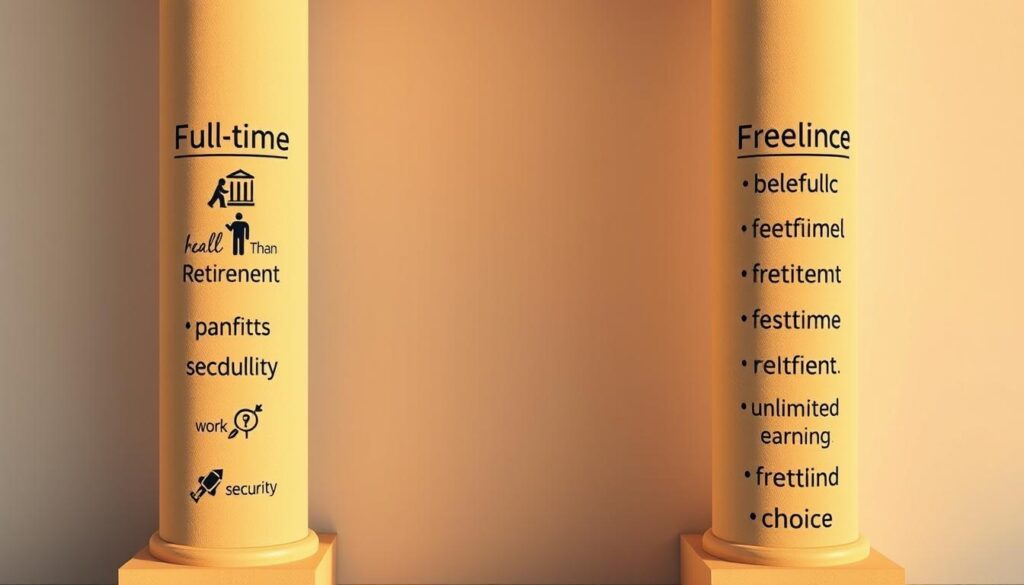Physical Address
304 North Cardinal St.
Dorchester Center, MA 02124
Physical Address
304 North Cardinal St.
Dorchester Center, MA 02124

Deciding between a freelance career and a full-time job can be tough. Many struggle with this choice when thinking about their career choices.
Each path has its pros and cons, impacting your work-life balance. A full-time job brings stability and security. Freelancing, on the other hand, offers flexibility and control.
When making your choice, think about what’s important to you. This article will dive into the main differences between freelancing and full-time work. It aims to help you decide what’s best for your career and personal life.
The modern work world has changed a lot in recent years. This change comes from new technology and a more diverse workforce. Now, we see more flexible work options, blending old and new ways of working.
Work has changed a lot over the last few decades. From the old 9-to-5 office job to flexible, remote, and freelance work, we now have more choices. This change is because people want better work-life balance, thanks to technology, and more control over their careers.
The gig economy, with its short-term, flexible jobs, is growing fast. Sites like Uber, Airbnb, and Upwork let people work on a project basis. This has made work more dynamic, with more choices and flexibility.
Some key features of the gig economy include:
As the gig economy grows, understanding its impact on traditional jobs is key. It shapes the modern work world in big ways.
The modern work world is changing fast. It’s important to know what it means to be a freelancer. Freelance work covers many areas and industries. They all share one thing: the freelancer works on their own.
A freelancer works for clients on a project basis. They don’t work for one company all the time. This setup gives them freedom and control over their work.
They can pick their projects, set their prices, and plan their schedule. Upwork’s Freelance Forward survey shows more people are freelancing. It shows how big and important this work is.
Freelancing isn’t just for one field. It’s in creative areas like writing, design, and photography. It’s also in tech fields like coding and consulting.
“The future of work is here, and it’s flexible,”says a report byFreelancers Union. It points out the many chances freelancers have.
Freelancers are seen as independent contractors. This changes how they handle taxes, benefits, and expenses. They must plan their finances well to follow tax laws and keep a steady income.
“The key to successful freelancing is not just about the work you do, but also about managing the business side of things.”
It’s key to understand being an independent contractor. This is crucial for anyone thinking about freelancing.
The job market is changing, and knowing about full-time employment is key. This model has been a mainstay of work, offering a steady and secure career path.
Full-time jobs usually mean working 40 hours a week, with set hours. They come with benefits like health insurance, paid vacation, and retirement plans. This setup gives workers a steady income and a clear line between work and personal life.
Today, full-time jobs are getting more flexible. Companies now offer remote work, flexible hours, or shorter weeks. Flexible full-time work arrangements can make employees happier and more productive.
Full-time workers have rights and benefits, like a minimum wage, overtime pay, and protection from discrimination. It’s important for both workers and employers to know these rights to ensure fairness and compliance.
Choosing between freelancing and full-time work affects your finances. It’s key to look at several financial points before deciding.
Freelancing can mean variable income, which is both good and bad. You might earn more by taking on many projects. Yet, income can be unpredictable, making budgeting hard. Full-time jobs usually offer steady pay, making it easier to plan your finances.
Key considerations for income potential include:
Freelancers and full-time workers face different tax situations. Freelancers must pay their own taxes, including self-employment tax. They need to keep detailed records to claim business expenses. Full-time workers have taxes taken out by their employers.
Tax responsibilities for freelancers include:
Freelancers must manage their business costs well. This includes expenses for tools, software, and marketing. Using tools for tracking expenses can make this easier.
It’s important to build financial security, no matter your job. This means saving for emergencies, planning for retirement, and investing wisely. Freelancers might need to find ways to get benefits like health insurance that employers usually provide.
By thinking about these financial points, you can choose the best job for your financial goals and stability.
The gig economy is growing fast. This makes it key to compare the benefits and legal protections of freelancers and full-time employees. More people are choosing freelance work, raising questions about benefits for those not in traditional jobs.

Full-time employees get a big benefits package. This includes health insurance, retirement plans, and sometimes life insurance. Freelancers, however, must find their own benefits. Here are some main differences:
Full-time employees get paid vacation days, sick leave, and sometimes parental leave. Freelancers don’t get these benefits automatically. They must plan for them in their business.
“Freelancers need to build a financial cushion to cover periods of illness or vacation,” advises a financial expert.
Freelancers and full-time employees both have legal protections. But the kind and how much differ.
Freelancers can make their own benefits packages by:
Knowing the differences in benefits and protections helps people make better career choices. It also helps them take steps to protect their financial and professional well-being.
Today, it’s crucial to know how work models impact our balance. Being able to manage our time is key to balancing work and personal life.
Freelancing often means more schedule flexibility. This lets people work on their own terms. It helps them balance work and personal life better. Yet, full-time jobs have set hours, which can make it hard to find personal time.
The work environment greatly affects our balance. Freelancers work from home, saving time and feeling more comfortable. Full-time jobs, however, mean longer commutes and less control over the work space. This can affect job happiness and personal life.
It’s vital to keep work and personal life separate. Freelancers need to set clear work hours. Full-time employees must also draw a line between work and personal time outside of the office.
Freelancers might feel isolated, missing out on social interactions. On the other hand, full-time employees deal with office politics and conflicts. Knowing these challenges helps us navigate our work environment better and maintain a good balance.
In summary, both freelance and full-time jobs have their pros and cons for work-life balance. By understanding these and finding ways to manage our time, we can lead a more balanced and satisfying life.
In today’s fast-changing work world, people need to think about their career paths. They can choose between freelancing or working full-time. Both ways have their own chances for growth and moving up.
Freelancing lets you try out different skills on various projects in different fields. This can make your professional portfolio stronger. Full-time jobs, however, often have training programs and chances to grow within a company.
Networking is key for career growth. Freelancers need to find places to network, while full-timers get help from their company’s networks. Good networking can lead to new chances and partnerships.
Looking at long-term goals, both freelancing and full-time jobs have benefits. Freelancers can grow their business and get more clients. Full-timers can move up in their company and have job security.
It doesn’t matter if you freelance or work full-time, building a personal brand is vital. This means having a professional online image, sharing your expertise, and always doing great work. A strong brand can open doors to new chances and improve your career.
In summary, both freelancing and full-time jobs have their own paths for growth. Knowing these options is important for making smart choices about your career.
The modern work world is changing fast. Many people are looking into new work models that mix freelance and full-time jobs. They want more flexibility, freedom, and balance in their lives.
Part-time jobs with freelance work are becoming popular. This setup lets people earn more by taking on freelance projects. It gives them a steady income and the freedom of freelance work.
Contract-to-hire jobs are another option. People start as contract workers but might become full-time employees later. This is good for both sides because it lets them try out the job first.
Remote full-time jobs are also on the rise. Thanks to better technology, many companies now hire remote workers. This means less time commuting and more flexibility.
Agency work and talent platforms are also changing the game. They connect people with jobs that fit their skills and interests. These platforms offer flexible work options, from freelance to full-time jobs.
In summary, new work models are changing how we work. They offer more flexibility, freedom, and balance. This is why more people are choosing these options for a better work-life balance.
The job market today is changing fast. Many people move between freelance and full-time jobs. It’s important to know how to make this switch smoothly.
Leaving a full-time job for freelancing requires careful planning. First, save enough money to live on while you start freelancing. Then, create a strong portfolio to show off your skills.
Also, build a professional network. This can help you find your first clients.
Freelancers wanting to go full-time should focus on their experience. Update your resume and online profiles to highlight your skills. Practice answering interview questions about your freelance work.
Money matters when switching jobs. Freelancers going full-time need to think about losing benefits like health insurance. Full-time workers turning freelance must plan for their own benefits and income.
Freelancers going full-time should keep in touch with old clients. This can lead to more work. Let them know about your career change to keep your professional network strong.
“The biggest risk is not taking any risk… In a world that’s changing really quickly, the only strategy that is guaranteed to fail is not taking risks.” – Mark Zuckerberg
Mark Zuckerberg is right. Taking smart risks is key in career changes. Knowing the steps and managing money helps you make the right choices.
Choosing between freelancing and full-time work needs a lot of thought. You must think about money, benefits, lifestyle, and career growth. Freelancers get to set their own hours and work on their own terms. But, they have to handle their finances and benefits by themselves.
Full-time jobs offer a steady paycheck, benefits, and chances to move up in a company. When deciding, think about what matters most to you. Freelancing is great for those who want flexibility and are okay with managing risks. Full-time jobs are better for those who like a set schedule and a stable income.
Knowing the good and bad of each option helps you choose wisely. This choice should match your goals and what you value most. Whether you pick freelancing or a full-time job, it’s a big decision that affects your life.
For more information, check out this article on the differences between being an employee and a freelancer.